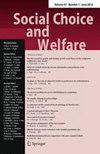Proportional representation in matching markets: selecting multiple matchings under dichotomous preferences
IF 0.8
4区 经济学
Q4 ECONOMICS
引用次数: 0
Abstract
Abstract Given a set of agents with approval preferences over each other, we study the task of finding k matchings fairly representing everyone’s preferences. To formalize fairness, we apply the concept of proportional representation as studied in approval-based multiwinner elections. To this end, we model the problem as a multiwinner election where the set of candidates consists of matchings of the agents, and agents’ preferences over each other are lifted to preferences over matchings. Due to the exponential number of candidates in such elections, standard algorithms for classical sequential voting rules (such as those proposed by Thiele and Phragmén) are rendered inefficient. We show that the computational tractability of these rules can be regained by exploiting the structure of the approval preferences. Moreover, we establish algorithmic results and axiomatic guarantees that go beyond those obtainable in the classical approval-based multiwinner setting: Assuming that approvals are symmetric, we show that Proportional Approval Voting (PAV), a well-established but computationally intractable voting rule, becomes polynomial-time computable, and that its sequential variant, which does not provide any proportionality guarantees in general, fulfills a rather strong guarantee known as extended justified representation. Some of our algorithmic results extend to other types of compactly representable elections with an exponential candidate space.

匹配市场中的比例代表制:二元偏好下的多重匹配选择
摘要给定一组具有相互认可偏好的智能体,我们研究了找到公平代表每个人偏好的k个匹配的任务。为了形式化公平,我们将比例代表制的概念应用于基于批准的多赢家选举中。为此,我们将问题建模为多赢家选举,其中候选人集由智能体的匹配组成,并且智能体对彼此的偏好被提升为对匹配的偏好。由于这种选举中的候选人数量呈指数级增长,经典顺序投票规则的标准算法(如Thiele和phragmsamen提出的那些)变得低效。我们证明了这些规则的计算可追溯性可以通过利用批准偏好的结构来恢复。此外,我们建立了超越经典的基于批准的多赢家设置的算法结果和公理保证:假设批准是对称的,我们证明了比例批准投票(PAV),一个完善的但计算上难以处理的投票规则,变成了多项式时间可计算的,并且它的顺序变体,通常不提供任何比例保证,实现了一个相当强的保证,称为扩展合理表示。我们的一些算法结果扩展到具有指数候选空间的其他类型的紧可表示选举。
本文章由计算机程序翻译,如有差异,请以英文原文为准。
求助全文
约1分钟内获得全文
求助全文
来源期刊

Social Choice and Welfare
Multiple-
CiteScore
1.60
自引率
11.10%
发文量
56
期刊介绍:
Social Choice and Welfare explores all aspects, both normative and positive, of welfare economics, collective choice, and strategic interaction. Topics include but are not limited to: preference aggregation, welfare criteria, fairness, justice and equity, rights, inequality and poverty measurement, voting and elections, political games, coalition formation, public goods, mechanism design, networks, matching, optimal taxation, cost-benefit analysis, computational social choice, judgement aggregation, market design, behavioral welfare economics, subjective well-being studies and experimental investigations related to social choice and voting. As such, the journal is inter-disciplinary and cuts across the boundaries of economics, political science, philosophy, and mathematics. Articles on choice and order theory that include results that can be applied to the above topics are also included in the journal. While it emphasizes theory, the journal also publishes empirical work in the subject area reflecting cross-fertilizing between theoretical and empirical research. Readers will find original research articles, surveys, and book reviews.Officially cited as: Soc Choice Welf
 求助内容:
求助内容: 应助结果提醒方式:
应助结果提醒方式:


